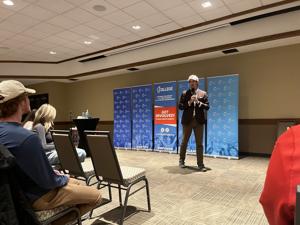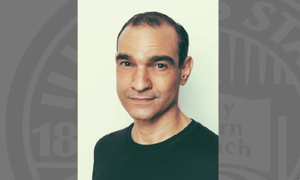Illinois State University’s Veterans Day panel discusses mental health
WARNING: This article contains mentions of suicide. Full disclosure: this article was also published on WGLT by the same author. As part of its annual Veterans Day celebration, Illinois State University hosted a panel discussion Monday, focusing largely on the mental health effects on those serving in the military. Panel members, who gathered in the Prairie Room at Bone Student Center, included veterans, close family members of veterans, ISU student veterans and ISU faculty who are familiar with military and mental health studies. Steve Krippel, a professor of military science with the Reserve Officers’ Training Corps [ROTC], introduced the panelists and posed questions, many of which focused on veterans’ mental health and suicide rates. “It is estimated that 22 veterans commit suicide each and every day, or approximately 8,000 ever year,” Krippel said. ISU Counseling Services staff psychologist Alex Doup, who has researched suicides among veterans over the age of 50, said there often are a series of contributing factors. “There can be a period or adjustment similar to [what] we see among individuals who are coming out from service and the adjustment to different roles and identities as well, too," Doup said. "With that, I think there’s a number of different stressors that occur throughout different stages throughout the lifespan.” Jess Ray, Normal Township supervisor and retired ISU director of veterans and military services, spoke on veteran suicides, focusing specifically on Vietnam veterans. “One of the things I hear a lot of veterans say is, ‘That thing [help and/or counseling] is there for someone else — they need it more than I do,” Ray said. “The culture, at least in the experience that I’ve had in the military, is that you suck it up, buttercup, and you move on.” Ray also served as an infantry soldier and sergeant in the Illinois National Guard, noting he's seen veterans struggle to ask for help. Ray also served as an infantry soldier and sergeant in the Illinois National Guard, noting he's seen veterans struggle to ask for help. “Back in the day, if you asked for help, that could impact your security clearance or opportunities for promotion,” Ray said. “I think the challenge is getting the information out to people so they know that there are resources out there and then to follow-up to figure out what to do to encourage people to take advantage of those resources.” ISU professor of psychology Eric Wesselmann offered ways to detect symptoms of mental health issues among veterans. “Social connection, or on the other side, a sense of isolation — of alienation — seem to be a major predictor for post-traumatic stress symptoms,” said Wesselmann, adding one way civilians can make a difference is by acknowledging the sacrifice that veterans have made to establish a sense of connection. Ray expressed appreciation for those in the Bloomington-Normal community who have made a difference. “We have people attending who really do try to make a difference in the community,” Ray said. “They let us know, those of us who have served, even if they don’t understand it, that we’re actually cared about. Former Lt. Col. Eric Murray from the Gold Star Mission shared how Gold Star families would like to talk about their fallen loved ones. “Asking the simple question, ‘Just tell me a funny story about them,’ because that’s what they want to do is share how they lived,” Murray said. “That’s the best way of capturing their character."
Latest Vidette
- RSO to know: Women in Business builds community and confidence on campusWomen in Business is an organization on campus that provides members with a way to grow both professionally and personally. It is open to all majors and gives students multiple ways to network and find internships and jobs. Junior business education major Abby Vandiver is currently serving as the 2025-2026 president of Women in Business. As the president of the organization, Vandiver is responsible for looking over all of the events and meetings. “One of the really cool things about my job as well is getting to be a part of the Student Leadership Advisory Board in the College of Business (SLAB),” Vandiver said. “Once a month, I get to meet with all the other presidents of other [registered student organizations] RSOs in the [College of Business] COB to discuss/collaborate on different events we may be having.” The organization hosts sponsored events, social events and fundraisers throughout the year. Vandiver's favorite memory from the club is connecting with members of the club during their events. “I look forward to every week and always enjoy getting to stay after our events and talk with other members,” Vandiver said. “There are nights that we may stay almost an hour after the event has ended just catching up with each other, and that is something that I love doing.” More information about WIB can be found on their Instagram.
- Former ISU student denied an appeal by Illinois Supreme CourtOn June 16, 1998, Christina McNeil was murdered in her home and found the next morning by her father, Barton McNeil, a former Illinois State University student. McNeil is now serving a 100-year sentence for the murder, but McNeil has maintained his innocence since first being accused. Now, 27 years later, McNeil faces his most recent denial for an appeal by the Illinois Supreme Court. McNeil, who is currently serving time at the Graham Correctional Center, is disappointed in the denial ruling. Still, he refuses to give up on the case and is determined to bring his daughter’s killer to justice. “In the last 25 years, my daughter’s cries for justice have been silenced. I am going to make sure that as many people as possible know the truth and get justice for Christina,” McNeil said. McNeil is not alone in this appeal denial. An inmate accused of armed robbery and murder in 199, Jamie Snow, has also been denied by the Illinois Supreme Court. While Snow has announced plans to seek clemency going forward, McNeil has admittedly stated he has no plans to seek clemency. “To receive clemency, a person has to admit to guilt and wrongdoing, which is something I will never do. I know I am innocent and refuse to admit to something I did not do,” McNeil said. McNeil believes that his ex-girlfriend, Misook Nowlin, is guilty of killing his daughter. Nowlin, who has denied these claims since the case first opened, is currently serving a 55-year sentence for the murder of her mother-in-law, Linda Tyda. Despite McNeil’s defense attorney entering DNA evidence and expert reports into evidence, a member of the 11th Judicial Circuit Court, Judge William Yoder, has ruled to deny this evidence being brought into the case. Fellow judge, and longtime witness and member of the case, Judge James Knecht, who has served for over 50 years as a judge in the state of Illinois, wished not to speak heavily on the case. However, Knecht did comment on the appeal system. “The appeals process exists so that every person can get their day in court and justice can be received,” Knecht said. McNeil has yet to give up hope and plans to do whatever he can to finally earn his innocence in court. McNeil’s cousin, Chris Ross, plans to soon host an event at Heartland Community College to spread awareness about McNeil’s case and wrongful convictions occurring in our justice system.
- Normal Town Council approves new art for sculpture parkAt the Normal Town Council meeting on Oct. 20, the council approved four new art pieces costing $69,750 for a planned sculpture park near the Community Activity Center at One Normal Plaza. The four artworks selected are all from artists based in Illinois and are all unique from one another. One piece by Dann Nardi is a large concrete circle that consists of several concrete balls that can be sat on and played on. The piece is titled “In and Out of the Blue.” Each of the sculptures is large, either in diameter or height, with a piece by Shawn A. Hensley titled “American Kestrel,” listed at eight and a half feet tall. The Town of Normal is planning on adding several other pieces of art to the area over the next few years.
- ISU Wind Symphony brings alumni and students together in powerful performanceThe Illinois State University Wind Symphony filled the Center for Performing Arts with energy and emotion Sunday afternoon as students and alumni came together for a performance led by special guest conductor Col. John R. Bourgeois, former director of “The President’s Own” United States Marine Band. The program featured classic pieces such as “Elsa’s procession to the Cathedral and Semper Fidelis,” a staple of the Bourgeois Marine Band repertoire. Audience members, including former members of the ISU Big Red Marching Machine, described the concert as both nostalgic and inspiring. 1972 ISU alumnus and former member of the Red Marching Machine, Larry Frank, spoke on how much the program has changed. “It’s heart-warming to watch what the current conductors have done with the program, how it’s continued to advance,” Frank said. “The students are playing really well. Dr. Marinello does a great job. It’s just a real treat to come back and watch this.” Frank, who performed with the university’s marching band from 1978 to 1988, said the concert brought back vivid memories of his time on campus. “It was just a wonderful experience,” Frank said. “Many memories came back. To watch the kids play was a real treat.” For current students, the concert represented not only a performance but a learning opportunity. Junior music education major and French horn player Sean Wright said rehearsals for the event were rigorous yet rewarding. “We usually spend two hours three days a week rehearsing all together, and the rest of that for our individual parts is our own practice time,” Wright said. “I think the whole thing went well. Working with the Colonel was very fun. He’s a very big name in the band world, so getting to work with him was great.” Wright said he especially enjoyed performing the closing symphony. “It was really, really cool, a very fun style to play,” Wright said. “Getting to hear this type of music, even though it’s not as big as it was back in the day, still ultimately brings people together.” Bourgeois praised the ensemble’s preparation and musicianship, noting that the university’s commitment to music education remains strong. “They did a spectacular job,” Bourgeois said. “Concerts like these unite us all, brings the community together. I found that this community is very much involved and very supportive.” Bourgeois, whose decorated career has taken him around the world, reflected on his own musical journey. “These fine musicians, much like myself in my career, have evolved greatly,” Bourgeois said. “As a young man, I played for the royal couple in Japan and even ended up coming back when they became emperor and empress.” The concert closed to a standing ovation, a testament to the Wind Symphony’s talent, Bourgeois and the timeless power of live music to connect generations.
- Turning Point USA at ISU hosts comedian Alex SteinIllinois State University’s Turning Point USA (TPUSA) hosted comedian Alex Stein on Monday in the Old Main Room at the Bone Student Center. Stein, known as “pimp on a blimp” and “prime time 99,” hosts “Prime Time with Alex Stein” on Blaze Media, an American conservative media network. Stein started by speaking about Derek Lopez, the ISU teaching assistant who recently lost his job, and thanked the audience for being present. “I know [ISU] has had a lot of controversy; some TA lost his job. I guess he’s mad at me for being conservative,” Stein said. Stein later answered a question about Lopez. “Having more class and respect is always the best … so be very careful. That’s the problem; these people are on [selective serotonin reuptake inhibitors] or antidepressants, so they’re impulsive and might try to punch [people],” Stein said. Stein also described Lopez as someone who “is probably on antidepressants … but anybody that acts like that is screwed up.” “He’s a girl. That’s what a girl does. He had a very feminine attitude by doing that,” Stein said. Stein spoke about Charlie Kirk, who visited ISU back in April. Stein said that the only reason he was there was because of Kirk. “Charlie Kirk was not just a good Christian, a good human being and a guy who actually cares about this country. He was a guy that was all about second chances,” Stein said. Stein also shared his views on gender roles. “We need to go back to more traditional roles. Women need to look pretty, men need to look ugly and that’s how we live in society,” Stein said. “We need to take back our masculinity in society and not be afraid to be misogynistic.” Dietetics and nutrition graduate student Katie Moyer was an attendee who enjoyed the event. “I was actually a part of Turning Point [during] my undergrad. I think it’s really important for people to open themselves up to hear other people’s side of things,” Moyer said. “I did notice there was a lot more security. Both sides can be violent, but I feel like there’s a lot of violent rhetoric being pushed from the left,” Moyer continued. “That makes them feel more comfortable that this is something that is acceptable because they know other people on the left are going to accept their behavior.” College of DuPage sophomore criminal justice major Madison Sanchez discussed the event’s environment. “I already knew a bit about Alex Stein, so I kind of knew what to expect. It’s going to be a little raunchy,” Sanchez said. “I think at the beginning there was definitely an air of hesitance, especially since Turning Point is trending on Twitter, but I believe as it went on everybody got a little more comfortable.” After the event, a protester was holding a “Fascists not welcome here” sign. The protester, Eddie, shared their reason for protesting. “I’m here because the fascists need to leave the campus and go far, far away,” Eddie said. “To me, it’s a bit obvious that the resurgence of anti-trans rhetoric is seeing this massive boost in popularity after these events.” “To a degree, campuses are often on the front line of the ideological battle in this country,” Eddie continued. “This is an organization that inherently makes people unsafe. Their presence here makes a great number of people feel unsafe.” The Vidette reached out to TPUSA for a statement but received no comment.
- 'Hamilton' star Javier Muñoz to speak at upcoming cultural dinnerUniversity Housing Services is hosting a cultural dinner from 5-8 p.m. Oct. 27 featuring actor and activist Javier Muñoz. The event will take place in the Brown Ballroom at the Bone Student Center. Muñoz is most notable for starring as Alexander Hamilton in “Hamilton” from 2016-2018. He is also an activist for LGBTQIA+ rights. Illinois State University has been hosting cultural dinners since the early 1980s. The goal of these dinners is to allow students to experience cultural diversity from around the world through a keynote speaker, a meal and entertainment related to the culture being featured. “The significance of the event is to bring a speaker who has a great message to spread, whether it’s about their experience or maybe a significant event [that] happened in their life, and we try to relate it to students,” Assistant Director of Marketing and Communications Hillary Campos said. “We really try to push it to students so that they can attend and see the speaker and have a dinner too, as well, that is hopefully significant with the individual’s background,” Campos continued. Campos also explained the most important traits for a featured guest. “We’ve done extensive research in looking at video footage of him speaking in front of a crowd, and he does a really good job with that,” Campos said. “We also think he has a really important message, not only about immigration, but also about his time, his career, his LGBTQIA+ experiences and just his advocacy for what he’s doing,” Campos continued. In the upcoming cultural dinner, Puerto Rican fusion cuisine will accompany Muñoz’s speech. Students can register for the event here.













